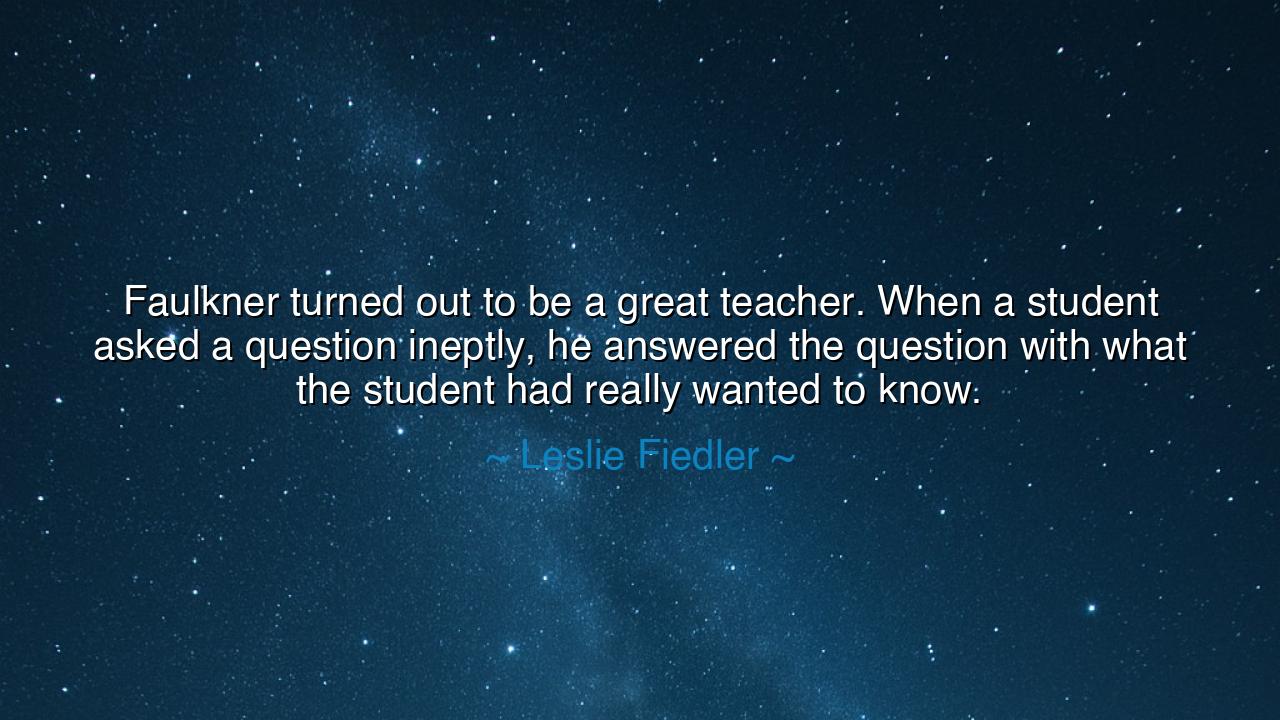
Faulkner turned out to be a great teacher. When a student asked
Faulkner turned out to be a great teacher. When a student asked a question ineptly, he answered the question with what the student had really wanted to know.






Leslie Fiedler once wrote: “Faulkner turned out to be a great teacher. When a student asked a question ineptly, he answered the question with what the student had really wanted to know.” At first, this may sound like a small remark on classroom practice, but within it lies a timeless principle of wisdom: the true teacher is not one who merely reacts to words, but one who sees into the heart of the seeker. The student may stumble, may clothe his yearning in awkward or clumsy speech, yet the wise guide perceives the hunger beneath the words and responds to that deeper need.
The origin of this moment rests in the legendary figure of William Faulkner, a man celebrated not only as one of America’s greatest novelists but also, as Fiedler reveals, as a man of patient instruction. In a classroom setting, when young minds came to him uncertainly, asking questions poorly framed, he did not mock, nor dismiss, nor confine himself to the letter of the inquiry. Instead, he discerned the spirit of the question and answered that. In this, he revealed the essence of great teaching: to listen not only to the mouth, but to the soul.
The ancients, too, knew this art. Socrates, walking the streets of Athens, asked questions that exposed the hidden desires of his students’ minds. When a youth phrased an argument clumsily, Socrates would reformulate it, gently drawing out the truth the youth had been struggling to reach. The words might falter, but the intent was precious. To hear intent and give it voice—this is the mark of the true teacher. And so Faulkner, though famed for his novels, revealed himself to be part of this ancient lineage of guides who look beyond surface to essence.
History offers another striking example. When young Thomas Aquinas, silent and awkward in his manner, was mocked as “the dumb ox” by his fellow students, his teacher Albertus Magnus perceived the power hidden within him. He said: “This ox shall one day fill the world with his bellowing.” And it was so. Aquinas, once the clumsy student, became one of the greatest theologians in history. Like Faulkner, Albertus answered not merely the stumbling of the student, but the deeper question of who that student truly was.
The meaning of Fiedler’s reflection is profound: it reminds us that teaching is not about pride, but about service. The ineptly phrased question may conceal a diamond of curiosity. The true teacher takes time to polish it, to give the student not the answer to what was asked in words, but to what was meant in spirit. To do this requires humility, patience, and vision—the ability to see beyond the fumbling voice into the light of the searching mind.
The lesson for us is clear: when you are placed in the role of teacher, whether in classrooms, in families, or in friendships, strive to answer not merely the words but the intent. Listen beyond the stammer. Discern what is truly being sought. In doing so, you not only instruct, you dignify the student, for you show them that their yearning is seen, their inner hunger is valid. Such guidance does not merely inform—it transforms.
In your own practice, this means cultivating empathy. When someone speaks, ask yourself: what is the heart behind these words? What is the true question beneath the clumsy phrasing? Do not mock, do not dismiss, do not rush. Instead, respond with generosity, offering not only an answer but also encouragement. Let your words be bridges to the truth that the other was struggling to reach.
Therefore, remember Fiedler’s praise: “Faulkner turned out to be a great teacher.” Let it remind you that greatness in teaching lies not in brilliance displayed, but in wisdom given. The teacher who can hear what is unspoken, and answer it with compassion, is the one who shapes lives, long after the classroom has faded. Be such a teacher, and your legacy will not be in your words alone, but in the lives you have awakened to their own deeper truths.






AAdministratorAdministrator
Welcome, honored guests. Please leave a comment, we will respond soon